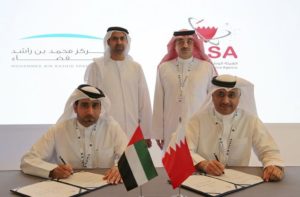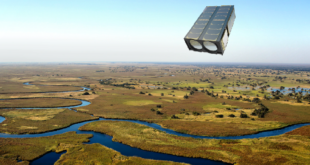
To enhance the cooperation strategy with different government organisations in the region, the Mohammed bin Rashid Space Centre, MBRSC, has signed a cooperation, information and data-sharing agreement with Bahrain’s National Space Science Agency, NSSA, for the application of satellite images and space research sciences.
The MoU was signed between Hamad Obaid Al Mansoori, Chairman of MBRSC, and Kamal bin Ahmed Mohammed, Bahraini Minister of Transportation and Telecommunications, Supervision and Control of NSSA, during the second Global Space Congress, launched on 19 March 2019 at the St. Regis Saadiyat Island, Abu Dhabi. The congress ends on 21 March 2019.
The agreement aims to expand the scope of cooperation between the two entities through the exchange of practical experiences and human resources in the satellite and scientific fields that include satellite, space sciences and remote sensing, their applications, satellite communications and world navigation systems with the use of satellites.
The MoU states that MBRSC will supply NSSA with multispectral satellite images and high-quality and corrected panchromatic images with coordinates system approved by NSSA and which will be captured via satellites launched by MBRSC. NSSA will also develop the current and future requirements associated with remote sensing and satellite images, provide the MBRSC with them for consideration, approval and provision according to priorities and available possibilities and provide the MBRSC with spatial and geographical data agreed to by both parties for processing satellite images and data.
AlMansoori stressed the importance of strategic partnerships with government organisations in the region. He said, “This MoU supports MBRSC vision to contribute to the transfer of expertise and knowledge to the region and supporting other institutions and agencies in the space sector. Moreover, this cooperation with Bahrain’s NSSA will contribute to building smart and distinctive cities based on the latest space science and remote sensing systems and applications. This comes in the context of the MBRSC research and development efforts in satellite services. The agreement will also contribute to enhancing cooperation for both sides through the exchange of practical experience and human resources development in the space and scientific fields.”
Kamal bin Ahmed Mohammed while expressing his pleasure at signing the MoU said, “This MoU is a framework for existing cooperation between MBRSC and NSSA, and it will open new horizons of cooperation in the field of space and its sciences and applications; it also enhances the presence of Arab countries in the space sector which reflects the vision of the leadership in both countries and their efforts to achieve sustainable development and prosperity.”
The terms of the agreement included the possible technical cooperation between the two parties so that MBRSC can identify the Bahraini NSSA needs and takes them into account in designing the future satellite specifications and study the available programmes and tools that may be efficient and useful in GIS and remote sensing applications.
The two parties will form a joint working team to review the implementation of the MoU, to complete the data exchange process and confirm that MBRSC will share satellite images with Bahraini NSSA to use it in various government sectors, departments and NSSA agencies after agreeing with MBRSC on the sectors that will use these images.
 SpaceWatch.Global An independent perspective on space
SpaceWatch.Global An independent perspective on space




